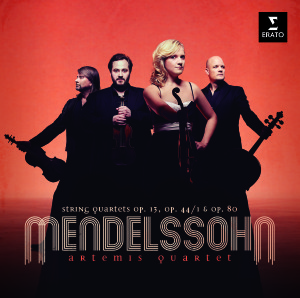Mendelssohn String Quartets: No 2 (opus 13); No 3 (opus 44 No 1); No 6 (opus 80)
Erato 0825646366903
TPT: 87’ 41” (2 CD)
reviewed by Neville Cohn
 In a more enlightened world than existed when Fanny – sister to Felix Mendelssohn – lived her tragically brief life, she’d have had far greater recognition as a composer than was the case in the mid-19th century. Women most certainly didn’t get a fair deal in those days. Indeed, to get her work into the public domain, Felix published some of his sister’s songs under HIS name! Apparently, that was just about the only practical way to get the songs known to the wider community.
In a more enlightened world than existed when Fanny – sister to Felix Mendelssohn – lived her tragically brief life, she’d have had far greater recognition as a composer than was the case in the mid-19th century. Women most certainly didn’t get a fair deal in those days. Indeed, to get her work into the public domain, Felix published some of his sister’s songs under HIS name! Apparently, that was just about the only practical way to get the songs known to the wider community.
But Felix and Fanny were not only siblings and very fine musicians. They were good friends – and when Fanny died, too early, her brother’s grief was overwhelming. He poured his sorrow into the writing of his string quartet opus 80 in F minor, one of his darkest works. And the Artemis musicians home in unerringly on its mournful essence. Certainly, it comes across with electrifying intensity.
There is about the music a barely controlled anguish, a breast-beating sense of bereavement. And in the second movement, bows bite strings to produce a grainy-toned, throbbing quality that sounds entirely right. In the adagio which follows, the Artemis ensemble is no less persuasive in evoking moods of hopelessness and despair. I cannot imagine anyone failing to respond to this darkest of all Mendelssohn’s quartets which could be thought of as a requiem for Fanny.
From first note to last, the Artemis Quartet is entirely in sympathy with the work.
Mendelssohn’s Quartet No 3 in D occupies a very different mood world, much of it bracingly buoyant and rhythmically emphatic, as refreshing in its idiosyncratic way as a cold shower on a hot day. How convincingly and confidently the Artemis players draw the listener into the composer’s vibrant teenage world. There’s a youthful audacity about the writing – and the Artemis musicians convey this with immense confidence and brio.
